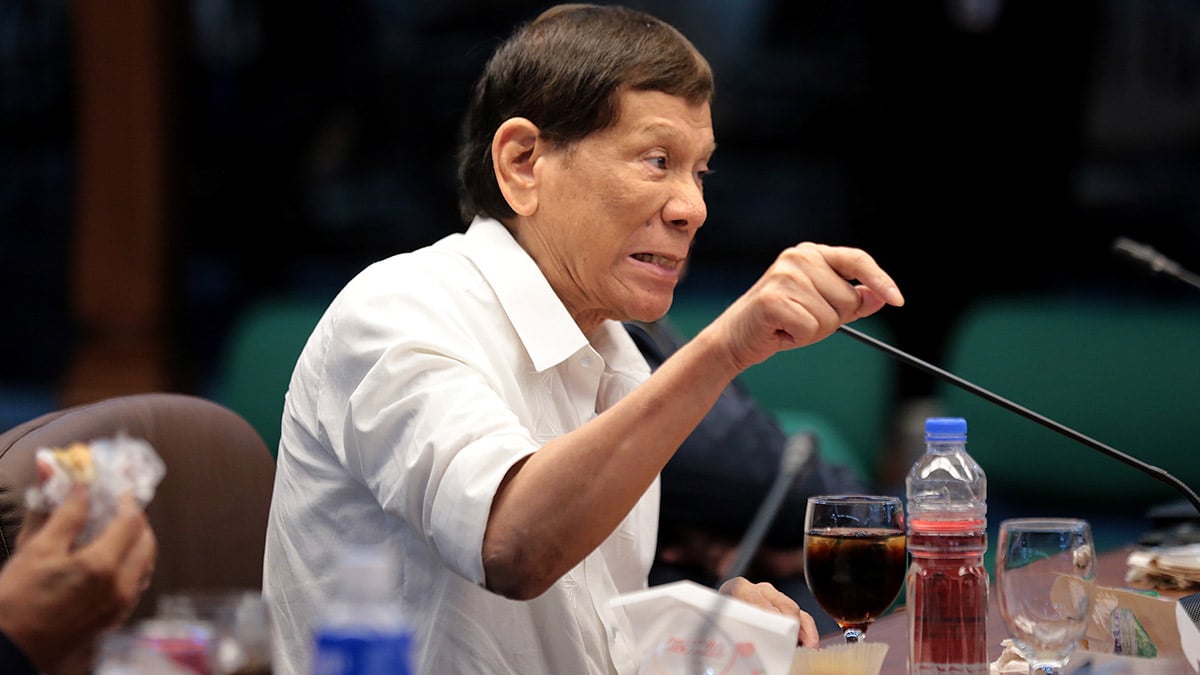Marcos: DOJ evaluating EJK evidence vs Duterte

Former president Rodrigo Duterte—GRIG C. MONTEGRANDE
President Ferdinand Marcos Jr. said on Thursday that Malacañang and the Department of Justice (DOJ) were closely following the congressional inquiries into the drug war to determine whether his predecessor, Rodrigo Duterte, could be held liable for extrajudicial killings (EJKs).
Duterte has testified in separate hearings—at the House of Representatives on Wednesday this week and at the Senate two weeks earlier.
The former President is already under investigation by the prosecutor of the International Criminal Court (ICC) for crimes against humanity in his war on drugs since his days as mayor of Davao City and later as president.
The Duterte administration has reported that more than 6,200 people were killed during his term from 2016 to 2022. Human rights groups believe the number could be as high as 30,000.
“Well, we are always monitoring all of these things because the question on EJK has not yet been answered. Who has been—who is responsible?” Marcos told reporters during a visit to Tagaytay City on Thursday.

Presence of mothers
He cited the presence of mothers of some of the victims of the bloody campaign during the congressional hearings “and up to now, they have not seen justice for the murders of their children.”
“So that—that is the DOJ’s responsibility—to continue to examine all bits of comments, of statements, of testimony, and eventually of evidence, to see that is a—that justifies a case to be filed,” he said.
During Wednesday’s House hearing, Duterte dared the ICC to “come and start the investigation tomorrow.”
“This issue has been left hanging for so many years,” he said in his exchange with Gabriela party-list Rep. Arlene Brosas. “I might die soon, and they might never get to investigate me.”
“Let them come here, and if I am found guilty, I will go to prison and rot there for all time,” the 79-year-old former President added.
‘We will not help’
But Marcos dispelled the notion that his administration was conceding to the ICC’s jurisdiction now that Duterte has expressed willingness to be subjected to the tribunal’s investigation.
The President’s policy, expressed by Executive Secretary Lucas Bersamin on Wednesday, was that Malacañang would not stand in the way of the ICC should Duterte voluntarily submit to the ICC.
READ: Marcos firm on non-cooperation with ICC over Duterte drug war probe
“We will not help, but if [Duterte] agrees to entertain the ICC or to be investigated, that is entirely up to him; that is no longer for us to decide,” Marcos said.
The DOJ will evaluate whether Duterte’s testimonies to the House and the Senate could be used as grounds for the filing of criminal charges against him, the President said.
“All of the testimony that was given yesterday will be taken in and will be assessed to see what in legal terms is the real meaning and consequence of some of the statements made by PRRD (Duterte),” he said.
“Now, if that will result in a case being filed here in the Philippines, we will just have to see,” he said.
READ: Marcos ditches talk on Duterte, focuses on storm victims
The President said the Philippines would not submit to the ICC’s jurisdiction after the country, upon the orders of Duterte in 2018, withdrew from the Rome Statute, the treaty that established the international tribunal.
Other treaty obligations
The country, however, has to comply with its other treaty obligations, including cooperation with the International Criminal Police Organization (Interpol), which could implement an arrest order from the ICC against Duterte, he said.
“As [Justice] Secretary [Jesus Crispin] Remulla explained before, we have obligations to Interpol, and we have to live up to those obligations,” he said.
The ICC, through its Office of the Prosecutor (OTP), signed a cooperation agreement with Interpol in 2004 in crime prevention and criminal justice. The agreement enables the OTP and Interpol to exchange information and criminal analysis and to cooperate in the search for fugitives and suspects. The agreement further gives the OTP access to the Interpol telecommunications network and databases.
In June 2006, Interpol issued the first wanted person notices on behalf of the ICC for five individuals suspected of war crimes and crimes against humanity in Northern Uganda.
Red notice system
The red notice system is part of Interpol’s global network of law enforcement agencies, created to assist in tracing and arresting internationally wanted fugitives.
The red notices are circulated among all Interpol member countries and include a request to arrest and detain the individuals if found. At present, Interpol has 196 member countries.
The red notice is one of the chief ways in which Interpol informs its member countries that an arrest warrant has been issued for an individual by a judicial authority. Many Interpol member countries consider a red notice as a valid request for provisional arrest.
In cases where an arrest is made based on a red notice, it is carried out by the national police in Interpol member countries. Interpol cannot demand that any member country arrest the subject of a red notice.
Won’t block Interpol
Last August, the DOJ said that the Philippines would not stop Interpol from serving arrest warrants from the ICC on individuals suspected of implementing Duterte’s bloody war on drugs.
“We are not in the business of blocking any movement of the Interpol unless a policy is laid out, which of course will go against our international commitments,” Remulla said then.
Days later, Remulla said that while the Philippines is no longer a member of the ICC, it remains committed to the Interpol.
“We don’t have a commitment with ICC anymore, but we have a commitment with Interpol and it is far-reaching. We need to remember that there are more than 10 million Filipinos around the world right now that might be needing the help of Interpol,” he said. —WITH A REPORT FROM INQUIRER RESEARCH